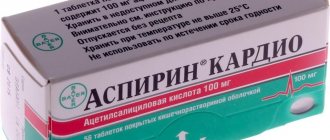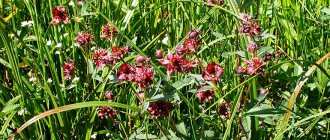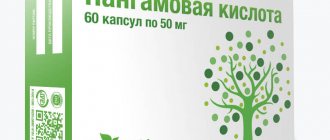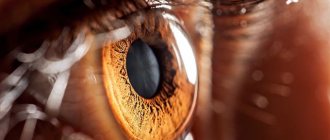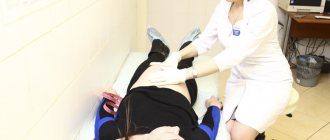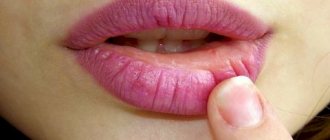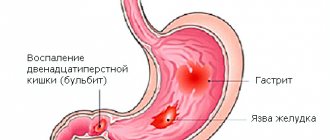The drug has a single form of release for oral administration: white, smooth, enteric-coated tablets. Each contains 50-300 mg. acetylsalicylic acid - the active substance. For its most complete absorption, the medicine also contains magnesium stearate, cellulose powder, lactose starch and other auxiliary components.
A package of Acecardol contains 30 tablets.
Pharmacodynamics and pharmacokinetics
The active ingredient is acetylsalicylic acid . The mechanism of action is based on the possibility of inhibition of cyclooxygenase by the active component, which causes inhibition of the production of thromboxane A2 and a decrease in platelet cell aggregation. The antiplatelet effect achieved by taking one tablet lasts for a week.
High dosages of the drug can have analgesic and antipyretic effects (over 300 mg). The drug is completely absorbed in the digestive tract and is only partially metabolized during absorption.
Mechanism of action
Aspirin (acetylsalicylic acid) in large doses has an antipyretic and analgesic effect. An amount of the substance not exceeding 100 mg is sufficient to reduce platelet aggregation and reduce the production of thromboxane A2, the main factor in the formation of blood clots. As a result of regular use of the drug, blood fluidity improves, its circulation in large and small vessels is restored, and the risk of ischemic attacks, strokes and heart attacks is reduced.
When the drug enters the stomach, irritation of the mucous membrane does not occur, since the tablet shell dissolves in the small intestine. Aspirin is quickly absorbed into the bloodstream within a few minutes. The therapeutic effect of one dose is a decrease in blood cell aggregation, lasting about 1 week. The kidneys are involved in excretion of the drug.
Indications for use of Acecardol
What are the pills for?
Acecardol is prescribed for unstable angina , to prevent recurrent myocardial infarction , to prevent pulmonary embolism (including its branches) and deep vein thrombosis (during prolonged immobility, for example, during prolonged surgery).
The drug is prescribed to patients with risk factors (high body weight, high cholesterol, diabetes mellitus , smoking, age, arterial hypertension ) to prevent acute myocardial infarction .
Instructions for use Acecardol recommends the medication for patients after invasive interventions and vascular operations (stenting, carotid angioplasty coronary artery bypass , arteriovenous bypass grafting) to prevent thromboembolism .
The drug is prescribed to patients with a transient disorder of the blood supply to the brain to prevent ischemic stroke.
Indications for taking the drug
Acecardol is recommended for use to reduce risk factors for vascular disorders and their exacerbations. The list of indications includes:
- physical conditions such as angina pectoris, obesity, high blood cholesterol, diabetes mellitus;
- atherosclerotic changes in the body;
- hypertonic disease;
- cerebrovascular accidents: age-related changes, existing ischemic processes, organic lesions;
- previous myocardial infarctions - to reduce the risk of relapses;
- the danger of thromboembolism of the pulmonary artery, including its branches;
- risk of deep vein thrombosis of the extremities with prolonged bed rest.
Acecardol should be used to prevent thrombosis and the development of vascular obstruction for people with bad habits: smoking, sedentary lifestyle. It is also indicated for those working in conditions that increase the risk of vascular pathologies. In addition, the medicine is prescribed after surgical treatment: coronary artery bypass, arteriovenous bypass, other types of vascular operations and for other reasons when long-term rehabilitation is necessary.
Contraindications
The medication is not prescribed to patients with erosive and ulcerative diseases of the digestive tract, hemorrhagic diathesis , bleeding from the stomach and duodenum. The drug is not prescribed for bronchial asthma caused by taking salicylates.
The drug is contraindicated for liver disease, heart failure , pathology of the renal system, and breastfeeding.
Simultaneous treatment with methotrexate at a dosage of more than 15 mg per week is unacceptable.
The use of Acecardol is limited in patients with hyperuricemia , gout , drug allergies, hay fever , and nasal polyposis .
Acetylsalicylic acid may cause bleeding during surgery.
Side effects
Digestive tract: increased levels of ALT and AST enzymes, vomiting, heartburn , nausea, ulcerative lesions and bleeding.
Hematopoietic system: anemia , risk of bleeding due to inhibition of platelet cell aggregation.
Allergic responses in the form of cardiorespiratory distress syndrome, swelling of the mucous walls of the nasal cavity, rhinitis, urticaria, Quincke's edema , itching and rash. Rarely, a severe allergic reaction such as anaphylaxis .
Respiratory system: spasm of small and medium-caliber bronchi.
Nervous system: impaired auditory perception, tinnitus, headaches, dizziness.
Contraindications and side effects
Acecardol has a common list of contraindications with other acetylsalicylic acid drugs:
- ulcerative or erosive lesions of the gastrointestinal mucosa;
- decreased blood clotting, hemorrhagic disorders, history of internal bleeding;
- aspirin-induced bronchial asthma, polypous growths in the nasal sinuses;
- severe renal failure, hepatosis;
- some forms of heart failure;
- hypersensitivity to salicylates or other NSAIDs;
- first and last trimester of pregnancy;
- lactation.
Acecardol is used with caution in the treatment of elderly people suffering from any types of allergies.
While using the drug, the body may experience undesirable reactions:
- bronchospasm;
- nosebleeds;
- swelling of the mucous membranes;
- exacerbation of inflammatory bowel diseases;
- changes in blood composition: decreased hemoglobin levels, increased liver tests;
- nausea, loss of appetite, heaviness in the epigastrium, attacks of vomiting;
- dizziness, headaches, physical weakness, tinnitus.
Exceeding doses is fraught with the development of gastric bleeding, the formation of ulcerative processes, and gastritis. If you are allergic to the drug, angioedema, skin itching, lacrimation, and conjunctivitis are possible. In these cases, discontinuation of Acecardol is required.
Acecardol, instructions for use (Method and dosage)
It is recommended to take the medicine before meals. It is advisable to take the tablets with a sufficient volume of liquid. The drug is prescribed for a long time. Frequency of administration – 1 time per day.
If acute myocardial infarction , 100 mg daily or 300 mg every other day is prescribed for prevention. Chewing the tablet provides a faster effect, which is very important in the first hours of myocardial infarction. In the presence of several risk factors at once, for the prevention of a first-time acute myocardial infarction, 300 mg is prescribed every other day, or 100 mg daily.
Prevention of unstable angina , recurrent infarction, prevention of transient disturbance of cerebral blood supply, ischemic stroke : 100-300 mg every day.
To prevent pulmonary embolism and deep vein , 300 mg is prescribed every other day, or 100 mg daily.
How to take Acecardol
In order to prevent and compensate for existing moderate vascular disorders, 100 mg (1 tablet) of Acecardol is prescribed daily or 1-2 times a week. In case of severe damage to arteries and veins, suspected heart attack or ischemic stroke, it is recommended to take 3 tablets with a dosage of 100 mg. or 1 pc. - 300 mg. in one day.
The drug must be taken before meals: swallowed whole, without crushing or chewing. The tablets should be taken with still water. Juices, tea and other drinks cannot be used. The attending physician selects a more precise treatment regimen.
Acecardol requires caution during simultaneous therapy with thrombolytics, anticoagulants, hypoglycemic drugs, and methotrexate. Coadministration increases the risk of hemorrhagic complications. The drug must not be combined with alcohol.
Before planned surgical operations or invasive diagnostic procedures, it is necessary to discontinue the medication no later than 7 days in advance.
Overdose
Possible mild symptoms such as: dizziness , nausea , headache , confusion, tinnitus, severe sweating, tachypnea, hyperventilation. In this case, treatment will involve gastric lavage, large consumption of activated carbon, and restoration of water and electrolyte balance.
In case of severe overdose, the following are possible: very high body temperature, respiratory disorders, cardiovascular system, nervous system, glucose metabolism, bleeding in the stomach and intestinal tract. In this case, urgent hospitalization is necessary.
Acecardol®
Overdose is unlikely due to the low ASA content in the drug.
Exceeding the dose of ASA is associated with a risk of gastrointestinal bleeding.
Overdose is especially dangerous in elderly patients.
Symptoms of overdose from mild to moderate severity: dizziness, tinnitus, hearing impairment, increased sweating (including profuse), nausea, vomiting, headache, confusion, tachypnea, hyperventilation, respiratory alkalosis.
Treatment: gastric lavage, repeated intake of activated carbon, forced alkaline diuresis, restoration of water-electrolyte balance and acid-base state.
Symptoms of moderate to severe overdose:
- respiratory alkalosis with compensatory metabolic acidosis;
- hyperpyrexia (extremely high body temperature);
— respiratory disorders: hyperventilation, non-cardiogenic pulmonary edema, respiratory depression, asphyxia;
- disorders of the cardiovascular system: cardiac arrhythmias, decreased blood pressure, depression of cardiac activity;
- disturbances in water and electrolyte balance: dehydration, impaired renal function from oliguria up to the development of renal failure, characterized by hypokalemia, hypernatremia, hyponatremia;
- impaired glucose metabolism: hyperglycemia, hypoglycemia (especially in children), ketoacidosis;
- tinnitus, deafness;
- gastrointestinal bleeding;
- hematological disorders: from inhibition of platelet aggregation to coagulopathy, prolongation of prothrombin time, hypoprothrombinemia;
- neurological disorders: toxic encephalopathy and depression of the central nervous system (drowsiness, confusion, coma, convulsions).
Treatment: immediate hospitalization in specialized departments for emergency treatment - gastric lavage, repeated intake of activated charcoal, forced alkaline diuresis, hemodialysis, restoration of water-electrolyte balance and acid-base status, symptomatic therapy. When carrying out alkaline diuresis, it is necessary to achieve pH values between 7.5 and 8. Forced alkaline diuresis should be carried out when the concentration of salicylates in plasma is more than 500 mg/l (3.6 mmol/l) in adults and 300 mg/l (2, 2 mmol/l) in children.
Interaction
Acecardol is able to enhance the effect of Heparin , Methotrexate , indirect anticoagulants (due to a functional disorder in platelets), antiplatelet agents and thrombolytic medications, Digoxin (due to a decrease in its excretion by the renal system), hypoglycemic agents, valproic acid (the mechanism is based on its displacement from connection with plasma proteins).
The risk of bleeding increases with the use of antiplatelet agents, thrombolytics and anticoagulants.
There is an increase in the toxic effect of ethanol on the functioning of the brain and nervous system with simultaneous consumption of alcohol.
Acecardol can weaken the effect of benzbromarone and other uricosuric medications (the mechanism is based on a competitive reduction in renal excretion of uric acid in the tubules), diuretics (due to a decrease in filtration rate at the glomerular level), and ACE inhibitors.
Systemic glucocorticosteroids weaken the effect of Acecardol by enhancing the elimination of salicylates.
special instructions
Acecardol can provoke bronchospasm and attacks of bronchial asthma . Risk factors: history of nasal polyposis , hay fever , drug allergies, bronchial asthma .
The achieved effect of inhibiting platelet aggregation persists for several days, which can cause bleeding during emergency surgical interventions. Before planned operations, the medication is discontinued at least 7 days in advance.
In predisposed patients, Acecardol in small dosages can cause gout. uric acid excretion are at risk .
As the dose of the drug increases, the risk of bleeding in the digestive tract increases significantly.
Acecardol does not affect the ability to drive a car. When treating with glucocorticosteroids, it is necessary to take into account that when they are discontinued, an overdose of salicylates is possible.
Acecardol's analogs
Level 4 ATC code matches:
Persantine
Aegitromb
Plavix
Coplavix
Chime
Cardiomagnyl
Polocard
Thrombo ACC
Brilinta
Magnicor
Plagril
Dipyridamole
Clopidogrel
Lopirel
Sylt
CardiASK
Aspirin Cardio
Aspinat
Aspicor
Analogues can be called drugs:
- Thrombo ACC
- Cardiomagnyl
- Aspinat
- Aceterine
- Aspirin
Acecardol price, where to buy
The drug is sold in packs of 30 tablets.
The cost of 50 mg tablets is approximately 20 rubles, the price of Acecardol 100 mg is 30 rubles, 300 mg is 50 rubles.
- Online pharmacies in RussiaRussia
ZdravCity
- Acecardol tablets p.p.o.
enteric solution 100 mg 30 pcs. Sintez AKO OJSC 27 rub. order - Acecardol tablets p.p.o. enteric solution 50 mg 30 pcs. Synthesis AKO OJSC
23 RUR order
